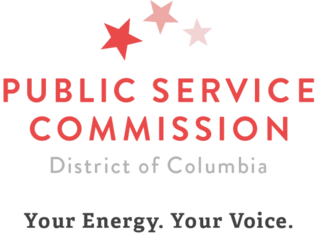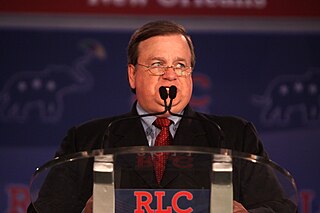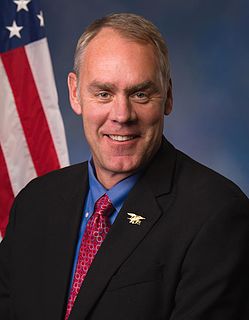Related Research Articles

Helena is the state capital of the U.S. state of Montana and the county seat of Lewis and Clark County.
In the United States, a utilities commission, utility regulatory commission (URC), public utilities commission (PUC), or public service commission (PSC) is a governing body that regulates the rates and services of a public utility, such as an electric utility. In some cases, government bodies with the title "public service commission" may be civil service oversight bodies, rather than utilities regulators.

The District of Columbia Public Service Commission is an independent quasi-judicial body and regulatory agency responsible for regulating landline telephone, electricity, and gas utility companies operating within the District of Columbia. It was established by the US Congress in 1913.
The Florida Public Service Commission (FPSC) is a five-member state board that serves to regulate private utility and telecommunications companies in Florida.
ACN, Inc. is a North American-based multi-level marketing (MLM) company which provides telecommunications, energy, merchant services and other services, depending on the country, through a network of independent sellers who also can recruit other sellers. Based in Concord, North Carolina, United States, ACN began operations in the United States in 1993. As of 2019, the company reported that it operates in twenty-seven countries.
The North Dakota Public Service Commission is a constitutional agency that maintains various degrees of statutory authority over utilities, telecommunications, railroads, grain elevators, pipeline safety, and other functions in North Dakota.
The Maryland Public Service Commission (PSC) is an independent administrative agency within the state government which regulates public utilities and certain taxi cab and other passenger services in Maryland. Similar to other state Public Utilities Commissions, the Maryland PSC regulates and sets tariff rates for natural gas, electricity distribution, local telephone, water, and sewage disposal companies. The PSC also sets the tariff rates for pilot services for vessels and privately owned toll bridges, approves the construction of electric generating plants and overhead transmission lines with a voltage above 69 kV, and licenses retail natural gas and electricity suppliers. The PSC offices are located in Baltimore in the William Donald Schaefer Building.

Eric Frederick Skrmetta is an American politician that represents District 1 on the Louisiana Public Service Commission (PSC), an influential regulatory agency which was the political springboard for former governors Huey Long, Jimmie Davis, and John McKeithen. Commissioner Skrmetta was born 1958 October 1 in New Orleans. Skrmetta is a member of the Republican Party.
The Georgia Public Service Commission (PSC) is a statutory organ of the state government of Georgia; elected among five commission districts, the board consists of a Chairman, a Vice-chairman, and three Commissioners. PSC regulates telecommunications, transportation, electric and natural gas services in the U.S. state of Georgia. Commissioners are elected in partisan elections statewide, though they must reside in a district.
The South Carolina Public Service Commission (PSC) is a regulatory agency that regulates public utilities in the state of South Carolina, including electric power, telecommunications, natural gas, and water & wastewater. In addition, the PSC regulates common carriers, including motor carriers of household goods and taxicabs. The PSC also oversees hazardous waste disposal. The headquarters of the PSC is in the state's capital, Columbia.
The Public Service Commission of Wisconsin is an independent regulatory agency responsible for regulating public utilities in the energy, telecommunications, gas and water companies located in U.S. state of Wisconsin. As of 2021, the agency regulated more than 1,100 electric, natural gas, telephone, water, and water/sewer utilities.
Monica Joan Tranel, is an American rower and Montana lawyer. She finished 4th in the women's eight at the 1996 Summer Olympics. She competed at the 1996 and 2000 Olympics.

Climate change has had a number of impacts on the US state of Montana. Heat waves are becoming more common, snow is melting earlier in the spring, and trees are dying as a result of drought, forest fire, and increased prevalence of forest insects. In the next few decades in Montana, climate change is most likely to impact water availability, agricultural yields, and wildfire risk. State and local governments have taken legislative steps, such as establishing a renewable energy portfolio and creating climate action plans, to mitigate the effects of climate change.

Matthew Martin Rosendale Sr. is an American politician and businessman from the state of Montana. A Republican, he is the U.S. representative for Montana's at-large congressional district in the U.S. House of Representatives, elected in 2020.

Angela McLean is an American politician and educator who served as the 35th Lieutenant Governor of Montana from February 10, 2014, to January 3, 2016. Governor Steve Bullock, a Democrat, selected McLean in 2014 to replace newly appointed U.S. Senator John Walsh after appointing Walsh to the vacancy created by Senator Max Baucus's resignation.

The 2014 congressional election in Montana was held on November 4, 2014, to determine who will represent the state of Montana in the United States House of Representatives. Montana has one at-large seat in the House, apportioned according to the 2010 United States Census.
The Federal-State Joint Conference on Advanced Telecommunications Services also known as the Section 706 Joint Conference on Advanced Services was created by the FCC in 1999, pursuant to section 410(b) of the Communications Act of 1934, with endorsement by the National Association of Regulatory Utility Commissioners (NARUC). Section 706 refers to the Telecommunications act of 1996. In this section the code states that the FCC is to "encourage the deployment on a reasonable and timely basis of advanced telecommunications capability to all Americans." The Joint Conference is intended to serve as a forum for ongoing dialogue among the FCC, state regulators, and local and regional entities about the deployment of advanced telecommunications capabilities, and to identify a set of "Best Practices" that promote rapid deployment, particularly to benefit the underserved. The Joint Conference has held a series of field hearings across the country and has conducted Broadband Summits.
Brad Johnson is an American politician from the U.S. state of Montana. A member of the Republican Party, he is the present chairman of the Montana Public Service Commission.

A general election in the state of Montana was held on Tuesday, November 3, 2020, with the primary elections being held on June 2, 2020. Voters will elect one member to United States House of Representatives and all five state constitutional offices, among other elected offices.

The 2022 United States House of Representatives elections in Montana will be held on November 8, 2022, to elect two U.S. Representatives from Montana, one from each of its congressional districts. Prior to this election cycle, Montana had one at-large district, represented by Republican Matt Rosendale. However, during the 2020 redistricting cycle, Montana regained the 2nd district that it lost in 1993. As a result, Montana became the first state relegated from multi-district to at-large status that reclaimed a 2nd representative in the House of Representatives.
References
- ↑ "Tschida, Pinocci Help Advance Bill to Put Big Tech Bullies in Their Place". Montana Daily Gazette. Retrieved 15 March 2021.
- ↑ "How the Public Commission Works". psc.mt.gov. Montana Public Service Commission. Retrieved 7 December 2014.
- ↑ Dennison, Mike. "New 5-0 Republican control of PSC may bring new direction, chairman for regulatory body". NewsBank. Billings Gazette. Retrieved 7 December 2014.
- ↑ Dennison, Mike. "PSC Chair Gallagher, citing battle with cancer, says he won't run for re-election this year". NewsBank. The Billings Gazette. Retrieved 7 December 2014.
- ↑ "PROTECTIVE ORDER--REQUESTS, TIMING OF REQUESTS, AND PROCEDURE". www.mtrules.org. Montana Secretary of State. Retrieved 7 December 2014.
- ↑ "How the Public Commission Works". psc.mt.gov. Montana Public Service Commission. Retrieved 7 December 2014.
- ↑ "How the Public Commission Works". psc.mt.gov. Montana Public Service Commission. Retrieved 7 December 2014.
- ↑ "How the Public Commission Works". psc.mt.gov. Montana Public Service Commission. Retrieved 7 December 2014.
- ↑ Dennison, Mike. "Vincent, Koopman take gloves off - PSC No. 3 race heats up". NewsBank. The Montana Standard. Retrieved 7 December 2014.
- ↑ Dennison, Mike. "PSC hits impasse over new chairman". NewsBank. Helena Independent Record. Retrieved 7 December 2014.
- ↑ "Final Order" (PDF). psc.mt.gov. Montana Public Service Commission. Retrieved 7 December 2014.
- ↑ "NorthWestern purchase of Montana dams complete". NewsBank. Associated Press State Wire. Retrieved 7 December 2014.
- ↑ "Final Order" (PDF). psc.mt.gov. Montana Public Service Commission. Retrieved 7 December 2014.
- ↑ "Final Order" (PDF). psc.mt.gov. Montana Public Service Commission. Retrieved 7 December 2014.
- ↑ "Final Order" (PDF). psc.mt.gov. Montana Public Service Commission. Retrieved 7 December 2014.
- ↑ "Final Order" (PDF). psc.mt.gov. Montana Public Service Commission. Retrieved 7 December 2014.
- ↑ "Final Order" (PDF). psc.mt.gov. Montana Public Service Commission. Retrieved 7 December 2014.
- ↑ "Final Order" (PDF). psc.mt.gov. Montana Public Service Commission. Retrieved 7 December 2014.
- ↑ "Final Order" (PDF). psc.mt.gov. Montana Public Service Commission. Retrieved 7 December 2014.
- ↑ "Final Order" (PDF). psc.mt.gov. Montana Public Service Commission. Retrieved 7 December 2014.
- ↑ "Final Order" (PDF). psc.mt.gov. Montana Public Service Commission. Retrieved 7 December 2014.
